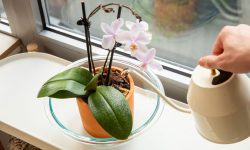Orchids are a beautiful and popular flower, cultivated by gardeners all over the world. Though they are commonly associated with tropical climates, there are actually many different types of Orchids, each with their own bloom time and requirements. While some Orchids can bloom all year round given the right conditions, others will only bloom for a short period during the year.
Understanding which type of Orchid you have, and providing the plant with what it needs to encourage blooming, is the key to keeping your Orchid in bloom year-round.
Orchids are a type of flower that can bloom all year round. They are native to tropical and subtropical regions, but can also be found in temperate climates. Orchids require little maintenance and can be grown indoors or outdoors.
The key to keeping an orchid blooming is to provide it with the proper care, including watering, fertilizing, and lighting. With the right conditions, an orchid can bloom for months at a time.
How to Make Orchids Bloom Constantly
If you love orchids and want to enjoy their blooms year-round, it’s not as difficult as you might think. Orchids are beautiful, exotic flowers that come in a wide variety of colors, shapes, and sizes. With proper care, they can bloom repeatedly throughout the year.
Here are some tips on how to make your orchids bloom constantly:
1. Give them plenty of light. Orchids need bright, indirect sunlight to bloom.
If you don’t have a spot in your home that gets enough light, you can use grow lights.
2. Don’t overwater them. Water your orchids once a week, letting the water soak through the potting mix until it drains out the bottom.
Then empty any water that collected in the saucer beneath the pot. Overwatering is one of the most common reasons why orchids fail to bloom.
3. Feed them regularly with an organic fertilizer formulated for orchids .
Fertilize every other week during active growth periods (usually spring and summer). Skip fertilizing altogether during fall and winter when growth slows down.
4 .
Repot them every two to three years . Use a potting mix specifically designed for orchids , which allows good drainage while still retaining moisture . Be sure to choose a pot that’s only slightly larger than the current one so you don’t encourage too much new growth all at once .
Also , be sure to sterilize all tools and pots before using them on your orchids to avoid introducing disease .
5 . Watch for pests and diseases . Check your plants regularly for signs of pests such as aphids , mealybugs , thrips , and scale . These can all be treated with horticultural oil sprays available at garden centers . If you see any sign of disease such as black spots on leaves , yellowing leaves , or mushy stem s , isolate affected plants immediately and consult a professional for treatment options .
How Do You Get an Orchid to Bloom Again?
Orchids are one of the most popular houseplants, and for good reason! They’re beautiful, unique, and relatively easy to care for. But even the best Orchid growers will sometimes have a plant that refuses to bloom.
If your Orchid is healthy but just not blooming, here are a few tips to try:
First, make sure you’re giving your Orchid enough light. Orchids need bright, indirect light to bloom well.
If your Orchid is getting too much or too little light, it may not bloom.
Next, check your watering schedule. Overwatering is the number one cause of death for Orchids, so it’s important to let the potting mix dry out completely between waterings.
On the other hand, if you let the potting mix get too dry, your Orchid may also refuse to bloom. The best way to tell if your Orchid needs water is to stick your finger into the potting mix – if it feels dry several inches down, it’s time to water.
Finally, fertilize regularly with an Orchid fertilizer designed for blooming plants.
This will give your Orchid the nutrients it needs to produce flowers. Be sure not to over-fertilize though – too much fertilizer can actually prevent blooming.
If you follow these tips and your Orchid still doesn’t bloom, don’t despair!
Some varieties of Orchids simply don’t bloom often. With proper care, most healthy Orchids will eventually produce flowers again – just be patient!
How Long Do Orchids Live
Orchids are one of the most popular houseplants because they are relatively easy to care for and have a long lifespan. Most orchids will live for several years, with some species lasting over 20 years. The key to keeping your orchid healthy and prolonging its life is proper care.
Here are some tips on how to care for your orchid so that it will thrive for many years:
Water: Orchids should be watered about once a week, allowing the soil to dry out in between waterings. Over-watering can lead to root rot, so it’s important not to let your orchid sit in water.
Light: Orchids prefer bright, indirect sunlight. If you grow your orchid indoors, place it near a window where it will get plenty of light without being directly exposed to the sun’s rays.
Temperature: Most orchids do best in warm temperatures, around 70-85 degrees Fahrenheit.
If you live in a colder climate, you may need to provide extra warmth for your plant during the winter months.
Humidity: Orchids like humid environments, so misting your plant regularly will help keep it healthy. You can also placing your orchid on a pebble tray filled with water to increase humidity levels around the plant.
How to Make an Orchid Grow a New Spike
If you want to get your orchid to grow a new spike, there are a few things you can do to encourage it. First, make sure that the plant is healthy and getting enough light. If it’s not, then it won’t have the energy to produce a new spike.
Once you’ve verified that the plant is in good shape, cut off any existing spikes about an inch above the base of the plant. This will stimulate growth hormone production and encourage the formation of a new spike. Finally, be patient!
It can take several months for a new spike to form and bloom.
How Long Do Orchid Blooms Last
Orchids are one of the most popular flowers in the world. They come in a wide variety of colors, shapes, and sizes. Many people enjoy growing orchids because they are relatively easy to care for and can bloom multiple times a year.
But how long do orchid blooms last?
The answer to this question depends on the type of orchid and the conditions under which it is grown. Some orchids, such as phalaenopsis (moth orchids), can produce blooms that last up to three months.
Other types of orchids, such as cattleyas, typically have shorter bloom periods of two to eight weeks. The key to prolonging the life of an orchid bloom is proper care.
Here are some tips for keeping your Orchids looking their best:
-Provide adequate lighting. Orchids need bright, indirect light in order to thrive. If you are growing your Orchids indoors, place them near a window where they will receive plenty of light without being directly exposed to sunlight.
-Water regularly, but don’t overdo it. Water your Orchids once a week, giving them just enough water so that the potting mix is moistened but not soggy. Allow the potting mix to dry out completely between watering sessions to prevent root rot.
-Fertilize monthly during active growth periods using a balanced fertilizer diluted by half. Stop fertilizing altogether when your Orchids are not actively growing (usually during winter).
By following these simple tips, you can keep your Orchid blooms looking beautiful for weeks or even months at a time!

Credit: www.dreamstime.com
How Do You Keep Orchids Blooming All Year Round?
If you want to have orchids blooming all year round, there are a few things you can do. First, choose the right varieties of orchids. Some bloom more frequently than others.
Second, give them the proper care. Orchids need bright light, but not direct sunlight. They also like to be kept moist, but not wet.
Be sure to water them evenly and allow the potting mix to dry out between waterings. Finally, fertilize regularly with a balanced fertilizer formulated for orchids. Follow these tips and you’ll enjoy beautiful blooms all year long!
Do Orchids Stay in Bloom All Year?
No, orchids do not stay in bloom all year. However, they can bloom multiple times a year if they are cared for properly. Each bloom cycle typically lasts around six to eight weeks.
What Do You Do With an Orchid After the Blooms Fall Off?
One of the most common questions we get here at Orchid Bliss is “What do I do with my orchid after the blooms fall off?” The answer, in short, is to keep doing what you’re doing! With a few minor tweaks, of course.
First things first: don’t panic. It’s perfectly normal for orchids to lose their blooms after a few weeks or even months of flowering. In fact, it’s actually a good sign that your plant is healthy and happy.
That said, there are a few things you can do to encourage your orchid to re-bloom:
1. Cut off the dead bloom stems close to the base of the plant. This will help encourage new growth.
2. Check your watering schedule and make sure you’re not overwatering your plant. Orchids like to be kept on the drier side, so err on the side of caution when it comes to watering.
3. Make sure your orchid is getting enough light.
If it’s been placed in a shady spot, try moving it to an area that gets more indirect sunlight throughout the day.
Should Orchids Bloom Continuously?
Orchids are one of the most popular houseplants, and for good reason! They’re easy to care for, come in a variety of colors and sizes, and best of all – they can bloom year-round with proper care.
While most people think of orchids as finicky plants that require a lot of attention, the truth is that they’re actually quite resilient.
With a little bit of know-how, you can keep your orchid blooming continuously for months (or even years!) on end.
Here are a few tips to get you started:
1. Choose the right variety.
Some orchid varieties bloom more readily than others, so it’s important to do your research before making a purchase. Phalaenopsis orchids are some of the easiest to care for, and they offer continuous blooms throughout the year with proper care.
2. Give them bright light.
Orchids need bright indirect sunlight in order to thrive – if you live in an area with low light levels, consider investing in grow lights specifically designed for plants.
3. water them regularly (but not too much!). It’s important to keep your orchids evenly hydrated, but be careful not to overdo it – too much water can lead to root rot which will ultimately kill your plant.
Stick to a regular watering schedule (once per week is usually sufficient), and make sure the pot has adequate drainage so excess water can escape freely.
4 fertilize monthly during the growing season . Orchids need fertilizer just like any other plant, but be sure to use one specifically designed for orchids – regular garden fertilizer will burn their roots.
Apply fertilizer once per month during the spring and summer months when growth is most active; reduce frequency to every other month in fall and winter when growth slows down slightly..
5 repot every 2-3 years .
As your orchid grows, it will eventually outgrow its pot; when this happens, carefully transfer it into a larger pot using fresh potting mix made specifically for orchids..
With these simple tips, you can enjoy beautiful blooms from your orchid year-round!
Will Orchids Bloom in Warm Weather Conditions All Year Round?
Orchids blooming in warm weather can be a delightful sight year-round. These exquisite flowers thrive in tropical climates, such as those found in Southeast Asia. With ample sunlight and consistent temperatures, orchids can happily flower throughout the year, adding elegance and color to any space. However, it’s crucial to provide proper care and maintenance to ensure their continuous bloom in warm weather conditions.
Your Orchid Will Bloom all Year Round. 7 Growing Orchids Tips You Should Know | iKnow
Conclusion
Orchids are a beautiful, popular flower that many people enjoy having in their homes. While they typically bloom for a few months out of the year, there are ways to encourage them to bloom all year round. By providing the right amount of light, humidity, and water, as well as fertilizing regularly, you can keep your Orchids healthy and blooming throughout the year.
With a little extra care, you can enjoy these lovely flowers no matter what time of year it is!






